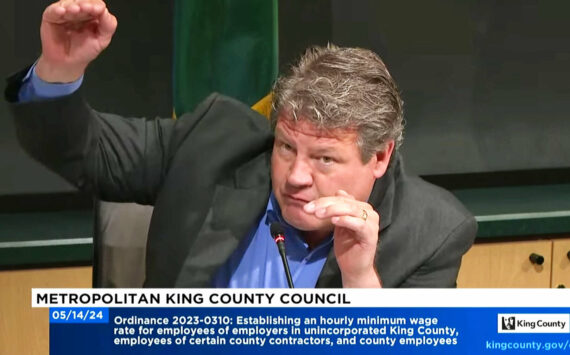Based on the all-staff memo, you’d think you should wish Nate Caldwell a nice vacation. Dated March 2, the mildly worded missive informs employees of the King County Department of Adult and Juvenile Detention that Caldwell, county juvenile detention director since late 1999, is on administrative leave for reasons unrelated to his job. “We anticipate that Nate will return in midsummer,” it concludes.
Not so fast. It’s likely Caldwell will be spending time in jail by the end of the year, but whether he’ll be there as a King County corrections administrator or as a federal inmate depends on a Florida court. He and three former colleagues from Florida’s Alachua County (Gainesville) Jail face an October 1 trial on felony charges that they withheld documents and falsified testimony in a civil rights suit filed by a former jail employee.
Colleagues are stunned with the latest turn in what was considered a triumph of rehabilitation and redemption. “It shocked me out of my tree,” says Arthur Wallenstein, former head of King County’s adult jail system. He says that he believed that under Caldwell’s leadership the troubled juvenile detention department could “turn the corner in a period of three to five years—that is how highly I thought of him.”
Just two years ago, Caldwell was promoted as the hope for reforming King County’s troubled juvenile lockup. And last year, department director Steve Thompson picked him to run the county’s adult jail in Kent.
But Caldwell withdrew himself from consideration for the adult jail job after some guards objected to his controversial past, and we don’t mean the Florida flap. Caldwell began his career in the corrections industry as a guest of New York State. As a teenage gang member, Caldwell was convicted of manslaughter in 1962 and spent five years in prison.
Like any defendant, Caldwell is innocent until proven guilty. Through his attorney, he declined to comment for this story. But no one disputes that a guilty verdict in the Florida trial would represent a depressing downturn in a career that reads like a novel: A poor African-American kid from Brooklyn joins a gang, gets involved in a fatal fight, and serves hard time in prison, yet works his way up in the corrections system from counselor to administrator to nationally recognized prison consultant. Only the latest developments could chill the sale of the movie rights.
CALDWELL WAS ALREADY considered a golden boy when he arrived in Florida in 1985. After his release from prison, he had established an impressive corrections r鳵m鬠starting at Manhattan’s Vera Institute of Justice Court Employment Project, a nonprofit corrections program. He spent almost a decade with the Federal Bureau of Prisons, working his way up to chief of the Jail Division with the National Institute of Corrections.
Ray Nelson, Caldwell’s predecessor as NIC jail division chief, recalls Caldwell as a first-rate employee and a well-liked administrator. Caldwell’s bosses knew of his criminal record, says Nelson. “I think they saw it generally as an asset because of his experience in the system.”
Nelson wasn’t particularly surprised that Caldwell took the Florida job. In his NIC post, Caldwell administered technical assistance programs and grants for county prison systems, but the Alachua County position would allow him to put these programs into practice. But county officials decided to keep their new hire’s felony record under wraps.
Caldwell’s early tenure at Alachua County appeared uneventful. He supervised the construction of a new county jail, which opened in 1994. But just days later, the controversy struck that would torpedo Caldwell’s Florida career—the jail’s highest profile inmate escaped. Richard Meissner, arrested in the stabbing death of a University of Florida graduate student, would be recaptured and convicted, but Caldwell’s jail operation would remain the focus of media and political scrutiny.
A timeline prepared by Gainesville Sun reporters documents Caldwell’s fall. In June 1995, Caldwell’s criminal record was revealed to the public; at the same time he admitted to illegally possessing two handguns and accepted a deferred prosecution from the Florida state attorney’s office. Two months later, county commissioners were forced to allocate an extra $1.2 million for unanticipated jail overtime. Then a grand jury was called to investigate jail mismanagement. Caldwell lasted until February 1996, resigning just as county officials began considering transferring jail operations to a private contractor.
Despite this record, Caldwell was hired by King County the following year as second in command to Nancy Campbell, director of what was then known as the Department of Youth Services. Detention officials here were up front about Caldwell’s criminal record. “I, for one, was very pleased that they were willing to consider this brother even though in his youth he had been charged and found guilty of manslaughter,” says County Councilor Larry Gossett, a member of the Law and Justice Committee. “His record had been impressive in terms of how he had worked himself up.”
At this job, it was Campbell who ran into trouble. She departed in 1999 after workers presented her with a “no confidence” petition, and Caldwell took over.
Meanwhile, back in Florida, the fallout from the Meissner escape continued. Three jail supervisors demoted by Caldwell following the escape filed a federal civil rights lawsuit against Alachua County in 1996. All three plaintiffs are African American. Alfred Dickerson’s demotion was especially curious because he hadn’t been on duty at the time of Meissner’s escape, nor did the event occur during the shift he regularly supervised.
Caldwell later testified that serious irregularities discovered during the official investigation led to Dickerson’s demotion. However, Dickerson claimed Caldwell and other county officials had conspired against him and the others (both of whom accepted settlements before getting to trial). Dickerson won his case, lost on appeal, and eventually reached a financial settlement with Alachua County.
But following a concurrent FBI investigation, three of Caldwell’s former jail colleagues were indicted on federal felony charges last year; in February a second indictment added Caldwell.
Among the claims included in the 11-page February indictment: Caldwell and other jail officials made false statements at Dickerson’s administrative appeal hearings, they testified falsely in depositions for Dickerson’s federal suit, and they covered up Charles Simmons’ leadership role in the escape investigation. Ironically, according to the indictment, Simmons was the jail official responsible for placing Meissner in an open housing unit (rather than a segregated cell) and was probably the person most culpable in the murder suspect’s escape.
IN THEIR OCTOBER TRIAL, Caldwell and his co-defendants each face up to five years in prison and $250,000 in fines. What happens if Caldwell is convicted? “He’ll be terminated,” King County Executive Ron Sims says flatly. If acquitted, he’ll be immediately reinstated, Sims continues. “I don’t punish innocent people.”
His critics within the King County department argue that even if acquitted, Caldwell shouldn’t be allowed to return to work. They point out that his Florida record shows recent illegal behavior (the gun incident) and a history of standing by while subordinates are targeted for unfair discipline. “He’s completely compromised—it doesn’t matter how the cases come out in Florida,” one former juvenile detention employee says. “The same type of activity that people say he engaged in here, he’s up on charges for back there.”
Caldwell continues to have his fans. County Council member Gossett points out that under Caldwell’s direction “we were able to ratchet the average daily population in juvenile from something around 200 down to something like 120,” he says. “That was an amazing feat.”
Sims calls Caldwell a change agent who pushed for treatment for mentally ill and drug-addicted detainees. “Nate’s also been very good at ferreting out people who need to be gone.”
On a personal note, Gossett adds that his job includes plenty of late-night visits to the juvenile detention facility, a duty Caldwell always worked to coordinate. “I represent the inner city communities of Seattle,” he says, “so more than any other legislator, I’m calling down there to find out how the children of constituents are doing.”
“I could not have asked for a better colleague,” says Wallenstein, now director of the Montgomery County, Md., Department of Corrections. “If people don’t like that, that’s fine, but I have to tell the truth from my perspective—this was a quality correctional administrator.”






